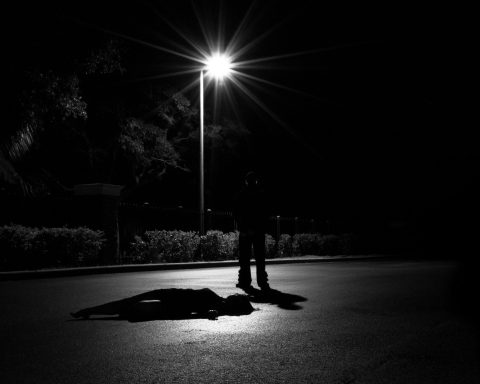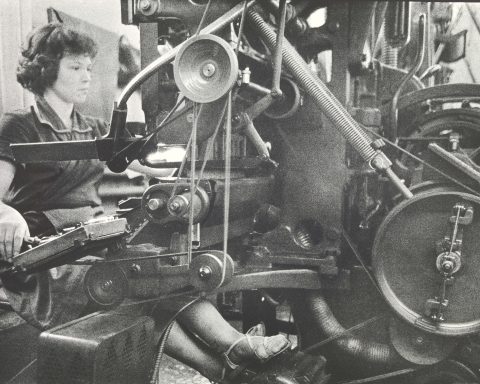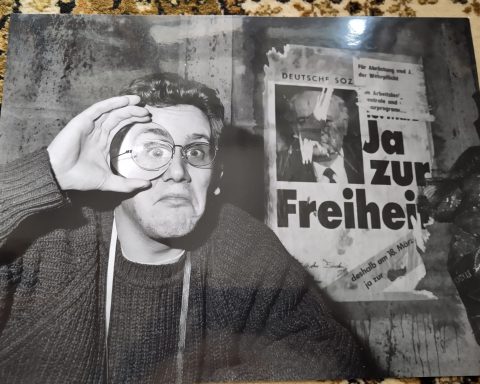One thing I find mildly disturbing is the readiness of many people I have encountered in Leipzig to refer to present-day “Nazis”. The first time I heard this term used, I pictured flag-waving, homophobic, anti-Semitic and racist skinheads.
Of course, they do exist.

At the end of 2015, the German Federal Office of the Protection of the Constitution (Verfassungsschutz) reported that there were 22,600 right wing extremists in Germany. Yet this amounts to 0.03% of the population and of these, fewer than 6,000 were Neo-Nazis.
Concern over the existence of such groups is well founded. The false labelling of conservatives is not.
The Protection of the Constitution Office defines right-wing extremism as an ideology where “affiliation to an ethnicity, nation or race determines the value of a person.” Key aspects of extremists’ agitation are “xenophobia and racism, anti-Semitism and revisionism of history as well as a fundamental aversion to democracy.”
Germany’s greatest problem is perhaps the lack of a middle ground between liberals and groups who oppose open borders. I believe that most do so not because they see potential migrants from outside the EU as inferior to themselves, but because they see their cultures and lack of assimilation as basically antithetical and incompatible with our European values of democracy, tolerance and equality.
The irony of the situation we see today is that the party helping Theresa May fulfil her Brexit promises and leave the EU, an institution which has demonstrated staunch commitment to equality and liberty, conforms in several ways to the definition of right-wing extremism from the Verfassungsschutz.
Thanks to our friends in Brussels, the Irish situation has received almost international attention in reports on Brexit.

The EU accepted the “Kenny text”, to safeguard Irish interests in the negotiations and guarantee that in the case of a united Ireland, Northern Ireland could seamlessly re-join the EU.
This time, the Northern Irish Democratic Unionist Party (DUP) has hit the headlines. Theresa May has been holding talks with the party leader, Arlene Foster, in a last-ditch attempt to form a government with their (conditional) support, following her disastrous loss of a majority government after a snap election.
The Democratic Unionist Party is flag-waving (flags being a source of constant tension in the North), homophobic and anti-abortion. While Europe has been congratulating itself following the defeat of more moderate right-wing parties in Holland, Austria and France, the DUP may have sneaked in through the back door.
In Northern Ireland, the DUP won 10 out of 18 seats and once again became the largest party, ahead of Sinn Fein with 7 seats. The DUP’s history and stance on issues ranging from terrorism to gay marriage have, for the first time, received international attention in the past days.
Senior party member Sammy Wilson described the Paris Climate Change agreement as “window dressing for climate chancers”.
The party is anti-abortion; currently, abortion is available in Northern Ireland only to women whose life is endangered by pregnancy. This policy has been declared incompatible with the European Convention on Human Rights.
Members of the party have even gone as far as to rule out abortion in the case of rape, calling for mothers to instead have their child adopted.
The party has vetoed gay marriage, even after the Northern Ireland Assembly voted in favour of it, making NI the only part of the United Kingdom where gay marriage is not legal. Ian Paisley Junior, son of the party founder, has called homosexuality “immoral, offensive and obnoxious” and said he was “repulsed” by gays and lesbians.
The DUP once supported a campaign called “Save Ulster from Sodomy”.
In 2016, at an event organised by Creation Outreach Ministries (a Christian group), speakers presented their belief in creationism, the idea that God literally made the world in seven days. The programme was backed by a DUP MLA, who wanted to see creationism “taught in every school.”
The latest scandal to engulf the party was their botched green energy scheme, fondly known as “cash for ash”. The DUP offered subsidies for wood burners installed in Northern Irish homes, when Arlene Foster was head of the Department of Enterprise, Trade and Investment. The government was paying out more than the costs of the burners and contributed to losses to the taxpayer of almost £500 million.
It is also, in part, due to this catastrophe that Northern Irish politicians have failed to form a local government since the Assembly elections at the beginning of March.
Foster has refused to step down as party leader while an external investigation is underway. Their potential coalition partners and staunch rivals, Sinn Fein, have refused to accept a power sharing agreement with Foster at the head of the party.
Other sticking points include Sinn Fein’s demand for equal status of the Irish language in Northern Ireland and how to deal with the legacy of the Troubles and related crimes.
Prime Minister May was more than happy to capitalise on Jeremy Corbyn’s unwillingness to categorically condemn the Irish Republican Army (IRA) as terrorists, the group being responsible for almost 2,000 deaths of civilians and security forces, as well as attacks on the Houses of Parliament.
Yet her new coalition partners have a history of connections with loyalist paramilitary groups such as the Ulster Defence Association, responsible for a sectarian killing just this year. The DUP’s previous minister and leader of NI, Peter Robinson, was an active member of the Ulster Resistance, which collaborated with other terrorist organisations to bring arms into the UK.

The party strongly backed Brexit, accepting an anonymous donation of £435,000 to pay for campaigning, not in Northern Ireland, but in the UK.
A few weeks ago, the Irish Times published a piece entitled “What connects Brexit, the DUP, dark money and a Saudi Prince?” It investigates the mystery of the DUP donor and its curious ties to the Middle East.
Jon Snow summarised the situation nicely, tweeting that “one of the most extreme political entities in the British Isles, the 10 MPs of the DUP, is to wag the tail of Mrs May’s minority Government.”
Concern over the government’s deal with the DUP has raised protests from many sides of the political spectrum.
But with official Brexit negotiations due to start in less than two weeks, the question that many are asking is how this will affect Brexit talks. The DUP is insisting on a “softer” Brexit to minimise disturbance in the relationship between North and South – and potentially promote the cause of Irish Unionism.

Questions are also being asked on how this will affect the restoration of the power-sharing agreement (between unionists and nationalists) in the North. These talks have been chaired by the Conservative Secretary of State James Brokenshire and his role here is now seen as a conflict of interest.
Prime Minister May, uncharismatic as she is, may have some laudable policies, such as her focus on mental health, education and home ownership. Under the Tories there are almost 2 million more people in work than under Labour, and there has been a special focus on creating apprenticeship places for young people. She has shown herself to be willing to make hard cuts to reduce the deficit as well as limit welfare payments to reward hardworking citizens.
However, her unmandated approach to Brexit and collaboration with the DUP has cast an ever-greater shadow on what began as a positive premiership. For many in Northern Ireland, this can only be seen as a huge leap backwards after years of progress and peace – not simply in terms of power sharing, but also in terms of social change.

In 1916, W.B. Yeats wrote after the Easter Rising in Dublin that “all (had) changed, changed utterly.” His words have proved to be timeless throughout 100 years of Irish and British politics.
The views of opinion piece writers do not necessarily reflect the views of The Leipzig Glocal. We encourage our contributors and readers to share diverse perspectives, and welcome constructive comments and discussion.








